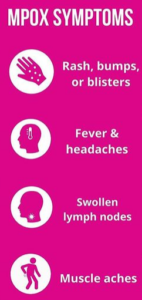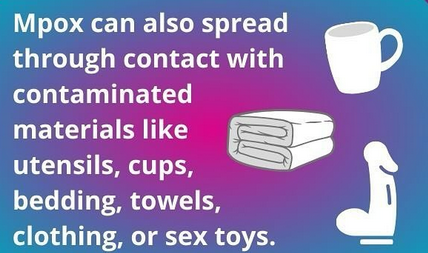
What is mpox?
Mpox is a disease caused by a virus from the orthopoxvirus family that also causes smallpox. Mpox causes less severe illness than smallpox. The main symptom of mpox is a skin rash or lesions, but symptoms can also include fever, chills, swollen lymph nodes, tiredness, muscle aches, headache, or respiratory symptoms..
Will I get really sick if I get mpox?
Most of the time, mpox is not life-threatening. Some groups, however, are at higher risk of getting seriously sick, including people with weakened immune systems (including people with advanced HIV), very young children (under 1 year old), people who have or who have had eczema, and people who are pregnant.

How can we protect ourselves from mpox?
One of the easiest ways to protect yourself from mpox is to get vaccinated! The JYNNEOS vaccine is approved for preventing mpox. People can also choose to practice behaviors that reduce their risk of exposure to mpox.
How do I know if I should get vaccinated?
The Advisory Committee on Immunization Practices recommends getting vaccinated against mpox if:
- You are a gay, bisexual, or other man who has sex with men OR are transgender
or non-binary AND, in the last the 6 months, have had any of the following:
- A new diagnosis of one or more sexually transmitted infections (STIs)
- More than one sex partner
- Sex at a commercial sex venue (for example, sex club, bathhouse, etc.)
- Sex during a large public event in an area where mpox transmission is occurring
- You are a sexual partner of a person that meets the description above.
- You anticipate experiencing any of the above.
Talk to your doctor or provider BEFORE getting vaccinated if you have previously had an allergic reaction to any of the following:
- Any other vaccine
- The antibiotics gentamicin or ciprofloxacin
- Chicken or egg protein.

How does mpox spread?
Mpox spreads through close skin-to-skin contact, including sex, and contact with bodily fluids. You can also be exposed by touching objects–such as clothing, bedding, or sex toys–used by someone with mpox that have not been disinfected.


Weren’t we done with mpox after 2022?
Communities did a lot of work to share information, lessen the risk of spread, and get vaccinated during the first mpox outbreak in 2022. In 2023, there were much fewer cases of mpox in the U.S. compared to 2022. Cases in 2024 leading into spring, however, are almost double the number the same time last year. We want to make sure that everyone who wants information, resources, and vaccines can continue to access them.
What is the JYNNEOS vaccine and how does it work?
Originally developed against smallpox, the JYNNEOS vaccine is made of a weakened and non-replicating version of the vaccinia virus. So it cannot reproduce in human cells and cause disease! Your body then learns to recognize and fight off the viruses that cause smallpox and mpox.
The JYNNEOS vaccine is a two-dose series given 28 days apart. If it is more than 28 days after your first shot, you do not have to repeat it, but get the second shot as soon as possible. Best protection occurs two weeks after you get the second dose.
I’ve already gotten both shots. Do I need a booster? How long does immunity last?
It is not currently recommended to get an mpox booster. If this changes, we’ll update the information here! Scientists are still studying how long vaccine protection lasts.

I’ve already had mpox. Should I get vaccinated?
If you have had mpox previously, it is not currently recommended to get the vaccine. But talk to your provider if you have a weak immune system.
Where do I get the mpox vaccine?
Aside from public health clinics, the mpox vaccine should now be available in pharmacies and physician offices. Check out STICKITIN’s vaccination pop-up events and service locator map.